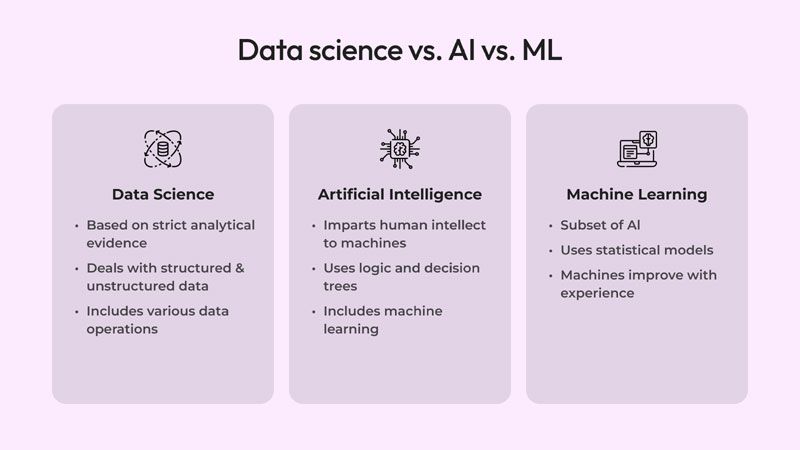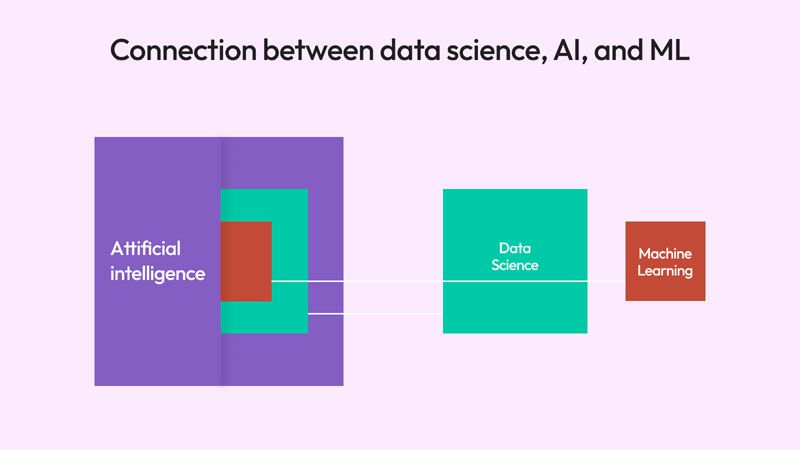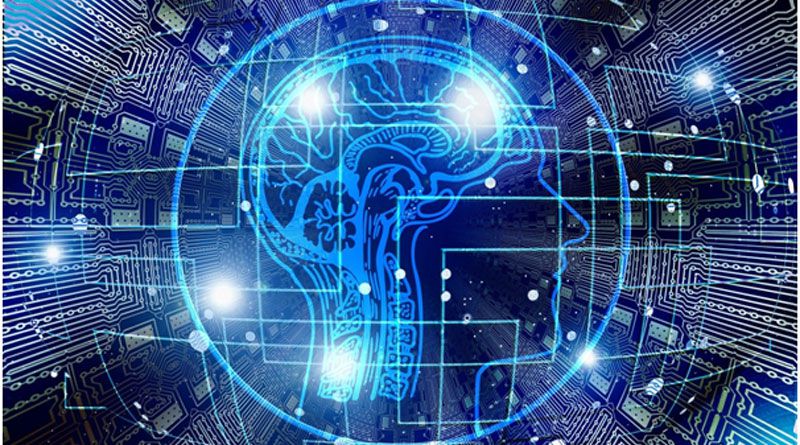Currently, there is widespread discussion and usage of data science, machine learning, and artificial intelligence, with occasional interchangeability of these terms.
However, it is important to understand the correct way to approach these topics. In this post, we will provide a comprehensive explanation of the distinctions between data science, machine learning, and artificial intelligence, and demonstrate their interconnectedness.
Before we proceed, let’s briefly examine what each of them represents.
Data Science: What Is It Exactly?
Data science is a crucial field with many applications. It combines various techniques to gain insights from data. Professionals use tools and algorithms to analyze large amounts of data. This helps improve operational efficiency and decision making.
Data science has found various useful applications in every major industry including healthcare, finance, retailing, telecommunications and more. For example, businesses can leverage the power of data science to predict customer needs using predictive analytics or identify patterns in customer behavior using cluster analysis. Similarly health care providers can use data science models to diagnose diseases accurately based on patient symptoms and medical history while financial institutions can use it to detect fraudulent activities before they occur. Moreover with the rapid advancement in technology such as cloud computing, data scientists are now able to store an enormous amount of data and apply complex algorithms & analytical techniques on them which allows us unlock previously hidden relationships between variables in a very precise manner.
What’s Artificial Intelligence?
Artificial Intelligence, or AI, is the field of research and development focused on creating computer systems that possess human-like intelligence. The task includes analyzing intricate data sets, recognizing patterns, and making decisions based on acquired information. AI research has resulted in the creation of technologies such as machine learning, deep learning, and natural language processing, which allow machines to think independently and solve problems.
AI has become increasingly important in decision making processes across a variety of different sectors. From self driving cars to chatbots helping customers with their queries on websites – AI is being used everywhere. AI is continuously progressing by leaps and bounds, affecting all aspects of our lives from healthcare to education and finance . Self driving cars detecting obstacles on roads through computer vision algorithms are being tested all over the world while doctors use artificial intelligence based tools during medical treatments. The development of AI has enabled businesses to make informed decisions efficiently without risking any human life in dangerous jobs like mine clearance or defusing bombs . Consequently AI has revolutionized the way people interact with technology within society.
What is Machine Learning?
Machine learning is a key aspect of artificial intelligence. It analyzes data and generates insights through the use of data science techniques. Specific tools and techniques are required for the cleaning, preparation, analysis, and extraction of insights from unstructured data. Machines have the capability to learn and improve their performance with minimal human intervention. Machine learning has the ability to efficiently process and analyze extensive amounts of data. The algorithm’s intelligence increases with the acquisition of additional information, leading to its development.
These advantages of machine learning allow businesses as well as everyday life to be changed virtually overnight due to their amazing ability to process loads of data quickly. Machine learning technology is aimed at recognizing data patterns and pinpointing anomalies, making it invaluable for predictive analytics. This, in turn, enhances business performance by leveraging insights to shape decision-making. Additionally, ML finds application in automation and autonomous systems, from self-driving vehicles to voice-activated digital assistants like Alexa. Furthermore, because ML can adapt to external input, it simulates human learning, leading to its growing prevalence in both personal and professional spheres of our daily lives.
Machine Learning vs. Artificial Intelligence vs. Data Science

Now, let’s explore the distinctions between ML and AI, the role of data science, and how they are interconnected.
What’s the Difference Between AI and Machine Learning?
Data Science is a field that uses data to extract knowledge and insights from raw information. It includes disciplines like data collection, cleaning, transformation, analysis, and interpretation of large sets of structured and unstructured data. Mathematical models are used in Data Science to identify patterns and trends, helping businesses make evidence-based decisions.
Machine Learning is a part of Data Science. It has experienced significant growth thanks to the accessibility of computing resources such as RAM and GPUs. ML utilizes algorithms to develop automated learning solutions that can predict patterns in data without the need for explicit programming rules. It also identifies trends and correlations in data to provide insights and automate decision-making by instructing computers on how to respond in specific situations.
Artificial Intelligence (AI) is a broader branch than the other two – it works on creating intelligent machines that can think and perform intricate tasks similar to humans or automatically decide on an individual’s behalf depending upon the situation without supervising constantly by a human being. AI also has its own set of technologies that work together on building solutions such as Computer Vision which helps recognize objects or images and Natural Language Processing (NLP) which facilitates communication between humans and machines. AI can be further divided into two subcategories – Weak AI which is focused on performing specific tasks, and Strong AI which is capable of taking multiple tasks and making decisions based on data.
How Data Science, AI, and ML Can Work Together

Data Science is a multidisciplinary field that incorporates principles from mathematics, statistics, computer science, and other disciplines to address intricate problems. The process includes collecting and analyzing data from different sources to provide useful insights for decision-making and identifying opportunities. Artificial Intelligence and Machine Learning play significant roles in this process.
AI represents a methodology for automating problem-solving tasks through the utilization of software, thereby creating intelligent machines that can carry out predefined functions based on a set of rules. Within the realm of AI, Machine Learning (ML) emerges as a subfield that relies on various algorithms, including decision trees, neural networks, and random forests, to distinguish itself. The primary divergence between AI and ML lies in the fact that ML algorithms are expressly designed to learn by scrutinizing patterns within datasets, which act as repositories of knowledge, progressively refining their ability to make increasingly accurate predictions over time.
Data Science practitioners play a crucial role in preparing these datasets, enabling machines to learn effectively. Consequently, when AI and ML are combined, they collaborate to offer comprehensive solutions. Data Science supplies the necessary information that aids AI and ML in their learning processes, contributing to improved outcomes. The results generated by AI and ML prove invaluable for data scientists, informing their research and decision-making endeavors. Regrettably, many business decisions are still made without due consideration of these valuable insights.
Data Science, machine learning, and AI are effective tools that can assist businesses in making improved decisions, decreasing expenses, and boosting profits. Businesses can gain a competitive edge in today’s economy by utilizing new technologies and the data streams they offer. Additionally, edge computing is becoming increasingly important as the demand for real-time processing of data at its source will grow with the rise of Internet-of-Things (IoT) devices.
Furthermore, AI is poised to play an increasingly pivotal role across various industries and in our daily lives, tackling complex problems that were once deemed insurmountable. For businesses willing to embrace the next level of data analysis and decision-making capabilities, Data Science, machine learning, and AI present myriad opportunities to formulate more intelligent strategies and pave the way for long-term profitability.

Namaste UI collaborates closely with clients to develop tailored guest posting strategies that align with their unique goals and target audiences. Their commitment to delivering high-quality, niche-specific content ensures that each guest post not only meets but exceeds the expectations of both clients and the hosting platforms. Connect with us on social media for the latest updates on guest posting trends, outreach strategies, and digital marketing tips. For any types of guest posting services, contact us on info[at]namasteui.com.

